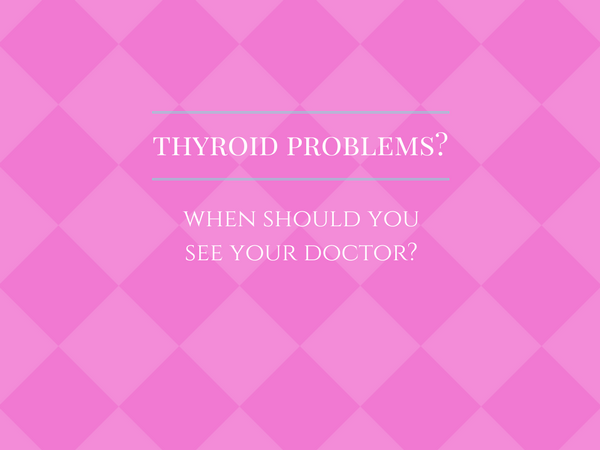Any signs of symptoms of a thyroid problem, in general, doctors recommend making an appointment with them. . That is because thyroid problems lead to a wide range of medical problems. Many of which can easily be remedied with simple thyroid treatments. Keep reading to find out more about getting medical treatment for your thyroid problem.
When You Have Symptoms of A Thyroid Problem
If you have symptoms of any type of thyroid problem such as:
- fatigue and sluggishness
- weight loss or weight gain
- lack of appetite
- mood swings
- insomnia
You need to see your doctor. Even if you’re not sure if you have a thyroid problem. You need to get it treated quickly if you do have symptom, since they can lead to more serious problems. Blood work reveals the underlying issues. Blood work can rule out other conditions too. It also helps your doctor be able to figure out what is causing these symptoms.
Every Few Months For Blood work
Routine check ups are necessary to monitor your thyroid problem. Checking for signs of a goiter in your neck, asking how your medication works, and running your blood work again make up the visit. This needs to be done every 3-4 months so they can find out if you need to have your prescription dosage adjusted or not. Should you find your doctor says there is nothing wrong…you should read this article: https://www.thyroidtreatmentforwomen.com/thyroid-test-came-back-normal-still-symptoms/
Kelp, Nettles & Alfalfa Endo Relief
Endo Relief Heartsong
Heartsong Ambition
Ambition
Thyroid.org explains the test for Thyroid Problems:
Blood tests to measure TSH, T4, T3 and Free T4 are readily available and widely used. Tests to evaluate thyroid function include the following:
TSH TESTS
The best way to initially test thyroid function is to measure the TSH level in a blood sample. A high TSH level indicates that the thyroid gland is failing because of a problem that is directly affecting the thyroid (primary hypothyroidism). The opposite situation, in which the TSH level is low, usually indicates that the person has an overactive thyroid that is producing too much thyroid hormone (hyperthyroidism). Occasionally, a low TSH may result from an abnormality in the pituitary gland, which prevents it from making enough TSH to stimulate the thyroid (secondary hypothyroidism). In most healthy individuals, a normal TSH value means that the thyroid is functioning normally.T4 TESTS
T4 circulates in the blood in two forms:
1) T4 bound to proteins that prevent the T4 from entering the various tissues that need thyroid hormone.
2) Free T4, which does enter the various target tissues to exert its effects. The free T4 fraction is the most important to determine how the thyroid is functioning, and tests to measure this are called the Free T4 (FT4) and the Free T4 Index (FT4I or FTI). Individuals who have hyperthyroidism will have an elevated FT4 or FTI, whereas patients with hypothyroidism will have a low level of FT4 or FTI.
Combining the TSH test with the FT4 or FTI accurately determines how the thyroid gland is functioning.
The finding of an elevated TSH and low FT4 or FTI indicates primary hypothyroidism due to disease in the thyroid gland. A low TSH and low FT4 or FTI indicates hypothyroidism due to a problem involving the pituitary gland. A low TSH with an elevated FT4 or FTI is found in individuals who have hyperthyroidism.
T3 TESTS
T3 tests are often useful to diagnosis hyperthyroidism or to determine the severity of the hyperthyroidism. Patients who are hyperthyroid will have an elevated T3 level. In some individuals with a low TSH, only the T3 is elevated and the FT4 or FTI is normal. T3 testing rarely is helpful in the hypothyroid patient, since it is the last test to become abnormal. Patients can be severely hypothyroid with a high TSH and low FT4 or FTI, but have a normal T3. In some situations, such as during pregnancy or while taking birth control pills, high levels of total T4 and T3 can exist. This is because the estrogens increase the level of the binding proteins. In these situations, it is better to ask both for TSH and free T4 for thyroid evaluation.
THYROID ANTIBODY TESTS
The immune system of the body normally protects us from foreign invaders such as bacteria and viruses by destroying these invaders with substances called antibodies produced by blood cells known as lymphocytes. In many patients with hypothyroidism or hyperthyroidism, lymphocytes make antibodies against their thyroid that either stimulate or damage the gland. Two common antibodies that cause thyroid problems are directed against thyroid cell proteins: thyroid peroxidase and thyroglobulin. Measuring levels of thyroid antibodies may help diagnose the cause of the thyroid problems. For example, positive anti-thyroid peroxidase and/or anti-thyroglobulin antibodies in a patient with hypothyroidism make a diagnosis of Hashimoto’s thyroiditis. If the antibodies are positive in a hyperthyroid patient, the most likely diagnosis is autoimmune thyroid disease.
THYROGLOBULIN
Thyroglobulin (Tg) is a protein produced by normal thyroid cells and also thyroid cancer cells. It is not a measure of thyroid function and it does not diagnose thyroid cancer when the thyroid gland is still present. It is used most often in patients who have had surgery for thyroid cancer in order to monitor them after treatment. Tg is included in this brochure of thyroid function tests to communicate that, although measured frequently in certain scenarios and individuals, Tg is not a primary measure of thyroid hormone function.
Any Time Your Symptoms Have Gotten Worse
If your symptoms are persisting even after taking medication for the thyroid problem, or have worsened; go see your doctor. Hormone levels can change dramatically, which requires an adjustment to your dosage. Surgical procedure to remove part of your thyroid gland might also be necessary. Medication alone might not be addressing the thyroid problem.
If You Develop a Goiter or Other Lump
Look at the front of your neck regularly. If you have a thyroid condition so you know if your thyroid enlarges. You might not actually feel the goiter in your neck. However, you can usually see a lump in front of your neck when you look in the mirror. A goiter needs to be checked out by a doctor.
When You Become Pregnant
If you are taking medication for a thyroid problem and you become pregnant, see your doctor right away. They need to run your blood work to see if your thyroid levels are changing. They also determine if the medications you have been taking are safe to continue taking while pregnant.
Endocrineweb.com explains the issue.
Untreated thyroid diseases in pregnancy may lead to premature birth, preeclampsia (a severe increase in blood pressure), miscarriage, and low birth weight among other problems. It is important to talk to your doctor if you have any history of hypothyroidism or hyperthyroidism so you can be monitored before, and during pregnancy and your treatment adjusted if necessary.
Symptoms of Hyperthyroidism and Hypothyroidism in Pregnancy
Hyperthyroidism
Symptoms of hyperthyroidism may mimic those of normal pregnancy, such as an increased heart rate, sensitivity to hot temperatures, and fatigue. Other symptoms of hyperthyroidism include the following:
- Irregular heartbeat
- Nervousness
- Severe nausea or vomiting
- Slight tremor
- Trouble sleeping
- Weight loss or low weight gain for a typical pregnancy
Hypothyroidism
Symptoms of hypothyroidism, such as extreme tiredness and weight gain, may be easily confused with normal symptoms of pregnancy. Other symptoms include:
- Constipation
- Difficulty concentrating or memory problems
- Sensitivity to cold temperatures
- Muscle cramps
Eat More Weigh Less Free GuideGet Your CopyFeel Better Naturally – Video GuideGet Your Copy











